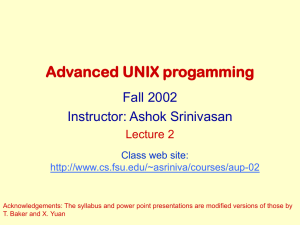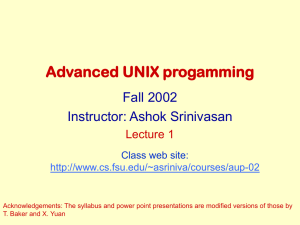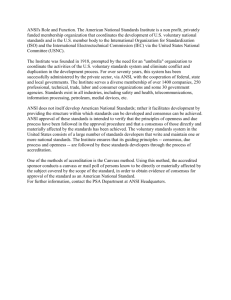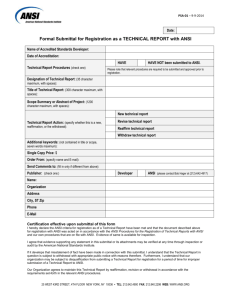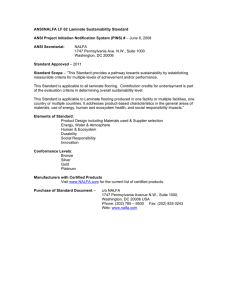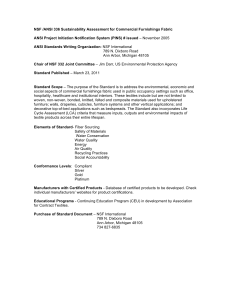Lecture 2: Miscellaneous UNIX/C concepts
advertisement
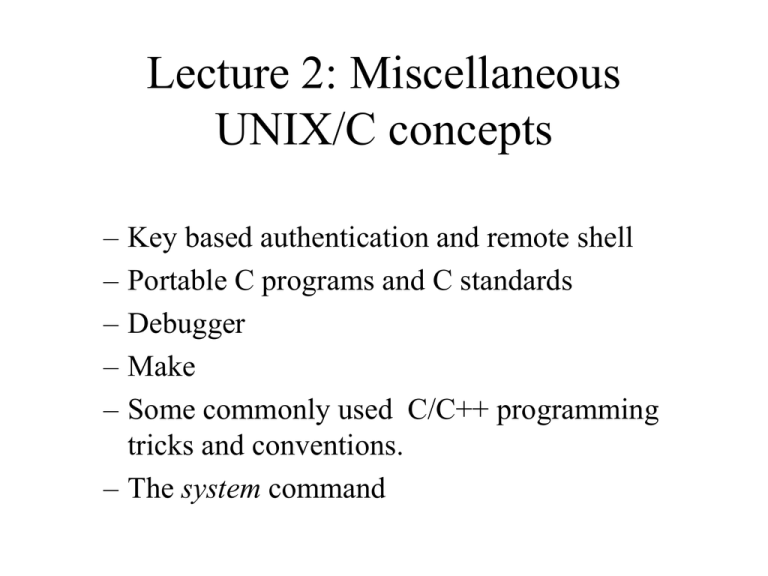
Lecture 2: Miscellaneous
UNIX/C concepts
–
–
–
–
–
Key based authentication and remote shell
Portable C programs and C standards
Debugger
Make
Some commonly used C/C++ programming
tricks and conventions.
– The system command
• ssh with Key based authentication
• Password based authentication is inconvenient at times
– Remote system management
– Starting a remote program
– ……
• Key based authentication allows login without typing the
password.
– Key based authentication with ssh in UNIX
• Remote ssh from machine A to machine B
Step 1: at machine A: ssh-keygen –t rsa
(do not enter any pass phrase, just keep typing “enter”)
Step 2: append A:.ssh/id_rsa.pub to B:.ssh/authorized_keys
•
More information, SSH with Keys HOWTO at
http://sshkeychain.sourceforge.net/mirrors/SSH-with-KeysHOWTO/SSH-with-Keys-HOWTO.html
• Portable C programs and C standards
– Portable programs are supposed to run on different
platforms.
• Most C compilers by default support ANSI C plus
extensions.
– The extensions kill the portability.
– Example non-standard constructs: typeof(var), ({a=1; b=2;}),
see example0.c (compiled with gcc and cc on program).
• Keys for writing portable programs
– Following language standard (e.g using ANSI C).
– Knowing which language extensions are used.
– C standards:
• Original ANSI C of 1989: ANSI/ISO/IEC 9899:1990
• ANSI/ISO/IEC 9899:1995
• ISO/IEC 9899:1999
• How to make sure that only standard C
constructs are used in a program?
– Using the right C compiler flags:
• gcc, cc
–
–
–
–
‘-ansi’: ISO C90 programs.
‘-ansi’ + ‘-pedantic’: reject non-ISO programs
‘-std=c99’: ISO C99 programs
‘man gcc’ for more information.
• Using ANSI C, the code must pass ‘–Wall –ansi –
pedantic’ with no warning messages
– All programs in this course must be compiled with ‘-Wall
–ansi –pedantic’ or ‘-Wall –std=xxx –pedantic’ unless you
know a specific reason to not use such flags.
• C compilers:
– See the example code (example1.c), how to fix
the errors/warnings?
– Some examples:
•
•
•
•
gcc –g –c –Wall –ansi –pedantic example.c
gcc –Wall –ansi –pedantic example1.c example2.c
gcc –g example.o
gcc –g example.o -lm
• Debugger:
– The code must be compiled with –g option.
– ddd, xxgdb, gdb
– The power of a debugger:
• Finding the line that causes coredump.
• See example (cannot do in this classroom, please try
after class):
– Break point/show value/change
value/step/next/continue/print
• Very efficient in debugging sequential code
• Not very effective in debugging concurrent code
(multiple threads, multiple processes)
• Core dump file
– The memory image file of a process when it
terminates (crashes).
– A common reason of core dump file not created is
resource limit on core file
– Controlling core file size is shell specific
• csh: limit [resource] [limit], or simply unlimit to remove
all limits
• sh: ulimit -c [limit]
– Load core dump file into debugger
• gdb: gdb executable_file coredump_file
• ddd: ddd executable_file coredump_file
– To locate the line that causes core dump
• backtrace (or bt)
• Make
• make [-f makefile][option] target
• A tool to update files that are derived from other
files. Great for software development.
• The default files are ./makefile, ./Makefile, and
some others in order.
– This is for POSIX make.
– Other make utility such as GNU make may do this slightly
differently.
• The default files can be overwrite with the –f option
– make –f myprog.mk
• Make
– The makefile has five components:
• Macros: define constants
• Target rules (explicit rules): tell when and how to
make targets
• Inference rules (implicit rules): also tell how to
make targets, make will first check if a target rule
can apply before it checks the inference rules.
• Directives: do something special when reading a
make file
• Comments: anything after a # sign.
• Macros:
– String1 = string2
– E.g. CC=gcc
CFLAG=-Wall –ansi –pedantic
– Some common variables:
•
•
•
•
•
CC: default C compiler
CXX: default C++ compiler
CFLAGS: flags for C compiler
CXXFLAGS:
……
• Target rules:
–
–
–
–
–
–
Target [target…] : [prerequisite…]
<tab> command
<tab> command
‘make [-f makefile][option] target’
…
Example:
a.out : myprog1.c myprog2.c myprog3.c
$(CC) myprog1.c myprog2.c myprog3.c
– Another example
– clean:
–
rm –f a.out
–
rm –f *.o
–
rm –f *~
–
rm –f *.pdf
• Inference rules:
–
–
–
–
Target:
<tab> command
<tab> command
…
• Target must be of the form .s1 or .s1.s2 where .s1
and .s2 must be prerequisites of the .SUFFIXES
special target.
– .s1.s2 make *.s2 from *.s1
– .s1 make * from *.s1
• Example:
.c:
$(CC) –o $@ $<
.c.o
$(CC) –c $<
$@: target file
$<: first prerequisite
$?: All newer prerequisites
$^: all prerequisites
• See the example makefile2
– How to modify the makefile if I want only
recompile one file instead of the whole system?
• makefile3
• A file (makefile4) with inference rules.
– What happens when we do ‘make a.o’? What
about ‘make b.o’?
– What happens when myprog2.o also depends
on myprog.h?
• UNIX convention:
– Normal execution: exit code 0
• This is the default exit code.
– Abnormal execution: exit with a non-zero code
– Try to follow this convention in this course, or
some utility may break.
• See example x.mk
• Some C programming tricks:
– Header files: contain common declarations.
• Source files use the #include directive to include the
header files.
• Sometimes using header files can cause problems,
see example2.c.
– Including a header file multiple times may cause
“duplicate declaration” errors.
– Why including stdio.h two times does not have any
problem?
» Look at /usr/include/stdio.h, this file is protected.
• Header files:
– The following mechanism prevents the body of
a header file from being included multiple
times.
#ifndef MYHEADER
#define MYHEADER
….
/* the body of the header file */
#endif
• How/when is a macro processed?
– Try ‘gcc –E example1a.c’ and ‘cpp
example1a.c’
#define MAX_LENGTH 256
For (I=0; I<MAX_LENGTH; I++) ….
• Macros with parameters:
– Macros with parameters look/work like
functions:
• #define max(a, b) (a>b)?a:b
– Macros with parameters need to be defined
carefully, otherwise weird things can happen.
• What is wrong with the following macro?
– #define sum(a, b) a+b
• What is wrong with the following macro?
– #define sum(a, b) a +b
– Checkout example3.c
• How to fix the problem?
• C programs with command line arguments.
– int main(int argc, char* argv[]) {}
• argc is the count of command line arguments. argc
>=1. Command line arguments are separated by
spaces.
• argv is an array of pointers to character strings that
contain the actual command-line arguments.
• See example4.c (link) for the use of command line
arguments.
– You will need to use command line arguments in most of
the programming assignments.
• The environment List (try ‘env’ )
– Environment variables can be defined in shell
• setenv DISPLAY L103:0.0 (tcsh)
• export DISPLAY=L103:0.0 (bash)
– These variables can be accessed in the program
• Why environment variables? To control the
behavior of a program.
– Historically,
• int main(int argc, char *argv[], char *envp[]);
• Not ANSI C.
– New methods for accessing environmental
variables:
• extern char **environ;
• This figure shows an example how the
environment list is organized.
• See example6.c for how to use environ.
• ANSI C also specifies a routine for
accessing environment variables:
– char *getenv(char *name)
– See example7.c.
• Other routines (not in ANSI, now in some
POSIX):
– int putenv(const char *str);
– int setenv (const char *name, const char *value,
int rewrite);
– void unsetenv (const char *name);
– See example8.c
• Some routines to parse/format strings in C:
– sprintf/sscanf
– sprintf(str, format, arg1, arg2….)
• Similar to printf except that the result is stored in str.
– sscanf(str, format, arg1, arg2,…)
• Similar to scanf except that the values are read from
str.
• Example: How to get all the fields from the output
of ‘ps’ on diablo?
– See example5.c for the use of sprintf/sscanf
• The system system calls:
– Allows commands to be executed in a program
– int system(const char *string)
• Works as if string is typed in a terminal.
• Returns the exit status (format specified by
waitpid()) if successful.
• Returns –1 or 127 if error.
– See example5a.c.
Review
• Why do we need Key based authentication? What does it allow
us to do?
• How to make sure your program is portable?
• What does the make utility do? Which elements in a make file
are the most important component in the file?
• What value should your UNIX program exit or return with?
• What to do to allow the .h file to be included multiple times
without causing errors?
• What is an environment variable and how to access it in a
C/C++ program? What is the purpose of environment variables.
• How to run a command in a C/C++ program?
• In what situation should we use sscanf?
